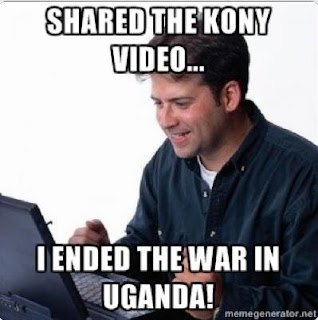http://www.merriam-webster.com/dictionary/producer
Produce what? Anything, be in tangible/intangible; a good, service or simply content.
 |
| "Scumbag" Youtube. http://www.quickmeme.com/Scumbag-Youtube/ |
Now, a user is someone who uses that production (yes yes, that’s two definitions with variations of the word in the answer but we’re all adults here). So, basically we could say the user is someone who uses a good, service or any kind of content.
But what happens when a user can be a producer? AN ABOLUTE GAME CHANGER, THAT’S WHAT!!!!!!
This phenomenon has been coined as the term "produsage" and is ramped all over the internet as websites like youtube, wikipedia, facebook, reddit, or even this very site (blogger).
So now that we know what on earth produsage is it remains to be seen, is it good, bad, or (as aforementioned) ugly.
The good of produsage is obvious, it allows content from Mr.Everyman to reach potentially millions of viewers. This unlocks more than just fame, it gives potentially anybody a voice. Where would Justin Bieber be without the internet? Probably being beaten up for looking like a girl in some secondary school in Canada. For those who don’t know when he was young Bieber was discovered by talent manager Scooter Braun on Youtube, where his mother posted videos of him singing for his family.
 |
| The internet can be a weird place. http://www.stuffistumbledupon.com/wp-content/uploads/2012/07/Justin-Beanber-justin-bieber-selena-gomez-meme-mr-bean-bieber-fever-lol-lulz-funny-pictures_thum.jpg |
The bad of produsage lies in not simply the users but the corporations behind it. Sure, youtube and blogger are great little tools curtesy of our overlords at the Google Corporation but herein lies the problem, produsage mediums aren't maintained to allow pure sharing for the user but rather to make money for the corporations.
And since these mediums exist to make money, all kinds of "who owns the content" issues emerge. Recently "Nintendo flexed its YouTube copyright muscle by issuing 'content ID match' claims on 'Let's Play' videos featuring its game franchises." Basically anything on YouTube featuring anything from Nintedo was fair game. "Prolific YouTuber Zack Scott, who is currently playing Luigi's Mansion: Dark Moon, claims that Nintendo has made content claims on several of his videos, meaning ad revenue received from those videos will instead go to Nintendo rather than Scott."
Whilst it's true that Nintendo owns the images, Zack made that content and viewers watch it to hear his take. It's a prickly area.
Read more at http://www.escapistmagazine.com/news/view/124066-Nintendo-Suddenly-Claims-Ownership-Of-Many-YouTube-Videos#QmlLp7J4yv6UT3iA.99
 |
| A T-Shirt Design from http://igametees.com/ |
Well well, the good and the bad of produsage is there for all of us to see, but most of you intelligent readers could easily identify the reasons above and many more. But where exactly does it get ‘ugly’? It gets ugly when the lines between the producer and the user don’t merely get blurred but completely corrupted.
In 2011 two attractive Kiwi lasses experimenting with cameras in their jeans and seeing how the lads of LA react. However we are being utterly and completely lied to. This video and the other couple in the series were produced by Levi Jeans as part of their Skinny jeans ad campaign.
http://fashionista.com/2011/02/exclusive-levis-is-behind-that-viral-butt-cam-video/
So, the point when it gets ugly is when the users think they are viewing content being generated by other users but it is actually them being cleverly marketed to thus thoroughly corrupting the whole system. Because after all, produsage is anonymous and thus thoroughly corruptible.
Are these mediums really giving us a voice or merely a like or digg button, is this really what we could consider a voice?
So the good is the fact it allows anyone anywhere to have a voice to the chorus, the bad is it is merely a tool for profit (the user being part of the tool) and the ugly is how thoroughly corruptible the whole thing is.
Produsage is certainly here to stay and we, the user, have to start wielding it as a weapon of free action and speech rather then let the corporationyness of it all get through.










